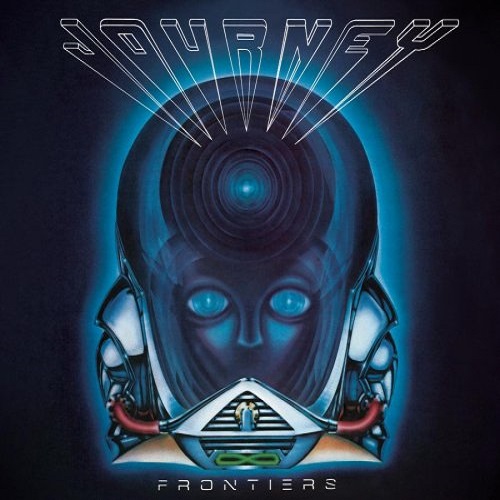
Frontiers (1983)

1. Separate Ways (Worlds Apart)
2. Send Her My Love
3. Chain Reaction
4. After the Fall
5. Faithfully
6. Edge of the Blade
7. Troubled Child
8. Back Talk
9. Frontiers
10.Rubicon
In retrospect, Escape would go on to define the apex of Journey’s career—a commercial and creative summit so high it was almost bound to be followed by some degree of decline. The usual problems surfaced: how do you follow a juggernaut? How do you even match it? Add to this the sheer weight of newly minted superstardom—saturation-level exposure, sold-out arenas, and even a Journey-branded video game—and it’s a wonder they managed to return to the studio at all. The landscape had shifted too. It was now 1983, not 1981, and many of the arena rock stalwarts who once ruled FM radio were being pushed aside by the leaner, shinier titans of the so-called New Wave.
Credit, then, to Journey for not panicking. They didn’t attempt a reinvention or a clumsy pivot. Instead, they gave us, in essence, Escape Part 2. The scarab beetle was retired, replaced on the cover by a cryptic chrome-and-neon android—likely a misstep, given what robots had just done to the credibility of a certain band from Chicago with an affinity for theaters and concept albums. Still, the nerves were settled the moment the first single dropped. Separate Ways (Worlds Apart) thundered out of speakers everywhere, a bombastic, keyboard-driven beast that may well be the most electrifying thing the band ever committed to tape. It carried more urgency than anything on Escape, yet still bore the melodic clarity that made Journey palatable to even the most casual listeners.
There are, inevitably, attempts to replicate the success of Open Arms. Send Her My Love and Faithfully both follow that now well-established blueprint, and while neither quite scales the emotional Everest of their predecessor, they remain masterclasses in the art of the power ballad—elegant, aching, and radio gold. But where Frontiers subtly trumps its older sibling is in the realm of hard rock. It was never Journey’s strong suit—at least not in the singles department—but tracks like Chain Reaction, Rubicon, and especially Edge of the Blade reveal a swagger and grit that had only previously been hinted at. Then there’s Back Talk, a track that sounds like a drum kit exploded in a recording booth, and in the best possible way. Steve Smith, too often overlooked in discussions of great rock drummers, finally gets his moment—and not incidentally, a co-writing credit.
Paradoxically, while the album may be Journey’s heaviest to date, it also feels their most commercial. The production is sleeker, the choruses bigger, and Jonathan Cain, once “the new guy,” was now firmly ensconced as the band’s key architect alongside Perry and Schon. For the most part, fans welcomed this shift—more polish, more anthems, more emotional gut-punches. But not everyone was on board. For a vocal minority, Journey’s omnipresence was becoming a bit much. They were, simply, *everywhere*.
And that kind of visibility comes at a cost. The pressures of fame, the creative differences, the touring fatigue—it all began to corrode what was once a tightly calibrated machine. Frontiers, then, stands not only as the band’s final unqualified triumph, but also as the point at which the wheels began to wobble. What followed would be splintered, contentious, and less consistent. But for this brief window, Journey stood at the very center of American rock—brash, beloved, and utterly unmissable.
Go back to the main page
Go To Next Review